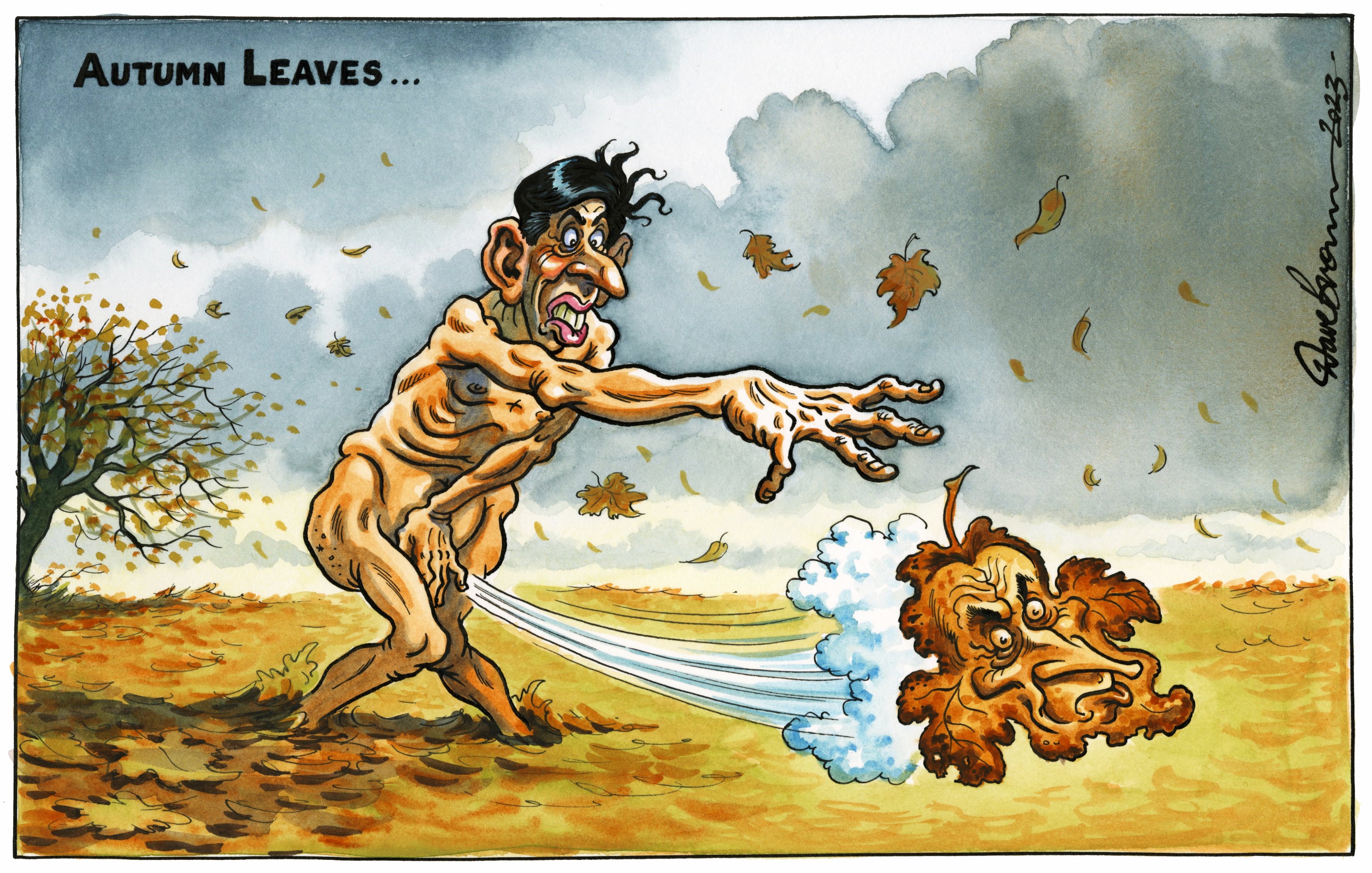One of the odder aspects of the government’s political campaigning is the way that it is focusing with extraordinary force on the two issues where it is most spectacularly failing. The past few days have demonstrated with equal force the folly of doing so.
The chancellor’s autumn statement featured what was effectively a small national insurance contribution rebate, but became propagandised as something like the biggest tax cut since the Romans were running things. You would not think from the blizzard of memes, press briefings and media interviews about the biggest tax cuts in history that the UK is still lumbered with the heaviest tax burden since the end of the Second World War. Such hype is obviously counterproductive when it runs directly against people’s experiences, which is the biggest fall in their living standards since records began in the 1950s.
Much the same goes for migration. Given the inherent problems of managing both lawful and irregular migration, a wise administration might choose to play it down – or even give some thought to telling the general public why migration might actually be a positive, and one way Britain can expand its economy, raise consumption and improve public services. Indeed, some economists suggest that Jeremy Hunt only had that little bit more headroom to cut taxes in the autumn statement because so many immigrants have underpinned economic growth and helped the UK avoid recession. No one is going to tweet that on the Conservative campaign headquarters X feed, however.
Instead, the government makes, and breaks, constant pledges about controlling our borders, reducing numbers, “stopping the boats”, and harps on about the “burdens” of immigration, blaming it for our poor – underfunded – public services. In the case of Suella Braverman and others, some use it to stir up hate and divide settled multiracial communities. The Rwanda plan is plainly impractical, illegal under international conventions and in any case far too small to make a difference to the small boats crisis. Yet still it dominates debate and consumes government time, to no great purpose.
But this sense of failure is hardly less apparent in legal migration. The 1.2 million people who came to the UK in the year to June 2023 – the gross figure before emigration is counted – is a very high figure even by recent standards. Historically, it is also a multiple of what was thought normal during, say, the time of the Windrush generation and after. Yet every single one of these individuals entered perfectly lawfully, with the correct paperwork, visas, jobs or university places, and sufficient money for them not to have to stay in ex-military camps or on accommodation barges. Many will have “no recourse to public funds” as a condition of entry. They are not a burden.
On the contrary: without these legal workers filling untold vacancies in the economy, whole sectors – such as social care, horticulture and hospitality – would collapse. Some universities would go bust. Yet many in government make out that Britain has sufficient spare labour that all we need to do is get them off disability living allowance and everything will be fine. It is disappointing, for what it’s worth, to see Yvette Cooper echoing that line, and blaming the government for not training enough people to fill the skills gaps (not least because it is often in lower-paid unskilled or semi-skilled work that the shortages are most acute).
The disquiet on the right of the Conservative Party and in allied sections of the media is not assuaged by the impeccable credentials of the assorted students and skilled workers who’ve made it to the UK under arrangements approved by parliament. With the possible exception of the (limited) humanitarian schemes set up for Afghans, Ukrainians and people fleeing Hong Kong, the numbers are still thought to be too large. In many cases these migrants are merely replacing those who used to come from the EU, before Brexit, but a net migration number of 672,000 apparently comes as an unwelcome shock to those who assumed that Brexit would pretty much end immigration. Where on Earth did they get that idea?
So ministers are again left with a policy that will never deliver on the pledges they make to the electorate. In truth, it has been this way since David Cameron chose to make migration a key policy when he was leader of the opposition. Theresa May invented the “hostile environment”, to no avail. At some point a casual pledge to keep net immigration to the “tens of thousands” was made, became a cap, and was never met.
By 2019, post-Brexit, the party election manifesto said nothing about numbers, and was formally committed only to “fixing” the system and introducing “an Australian-style points-based immigration system”. This they have done – and in full consciousness of the consequences, which is that merely having an “Australian-style points-based immigration system” doesn’t equate to low numbers. But the voters were led to believe it would.
Everyone in government knows that if net migration was ever reduced to the tens of thousands then the economy would experience such a shock to the labour market that it would provoke a slump and push wage costs and inflation back into double figures. So the dissonance between the hardline anti-migrant rhetoric and the failed policy continues, embarrassing every Tory MP who finds themselves in front of a microphone.
The disease of “cakeism” spread by Boris Johnson is still prevalent in crucial areas of Conservative policy. The government wants to pretend to lower taxes while keeping them high, and to say it is cutting migration when it knows it is practically impossible to do so. It thinks the public are too dim to notice. Well, they are weary of it, even if the Tories aren’t.




Join our commenting forum
Join thought-provoking conversations, follow other Independent readers and see their replies
Comments